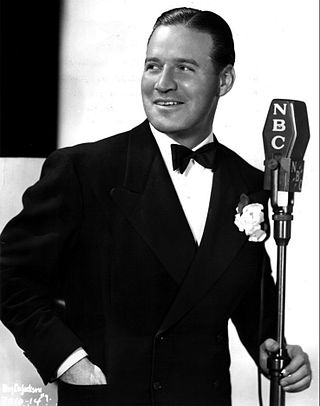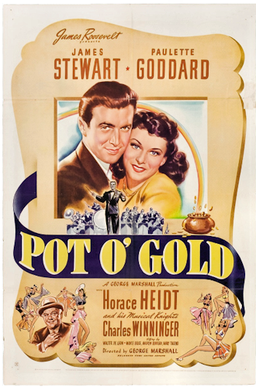Related Research Articles

Frankie Carle was an American pianist and bandleader. As a very popular bandleader in the 1940s and 1950s, Carle was nicknamed "The Wizard of the Keyboard". "Sunrise Serenade" was Carle's best-known composition, rising to No. 1 in the US in 1938 and selling more than one million copies.

Horace Heidt was an American pianist, big band leader, and radio and television personality. His band, Horace Heidt and his Musical Knights, toured vaudeville and performed on radio and television during the 1930s and 1940s.

Edward Evan Duncan Howard was an American vocalist and bandleader who was popular during the 1940s and 1950s.

The King Sisters were an American big band-era vocal group, appearing as a trio or quartet. Six sisters were in the group at one time or another: Alyce, Donna, Luise, Marilyn, Maxine, and Yvonne King.
The Yankee Network was an American radio network, based in Boston, Massachusetts, with affiliate radio stations throughout New England. At the height of its influence, the Yankee Network had as many as twenty-four affiliated radio stations. The network was co-founded by John Shepard III and his brother Robert, in 1929–1930. The beginnings of what became the Yankee Network occurred in the mid-1920s, when John Shepard's Boston station WNAC linked by telephone land lines with Robert Shepard's station in Providence, Rhode Island, WEAN, so that the two stations could share or exchange programming. Those two stations became the first two Yankee Network stations. In 1930, they were joined by the first affiliated radio stations, including WLBZ in Bangor, Maine; WORC in Worcester, Massachusetts; WNBH in New Bedford, Massachusetts; and WICC in Bridgeport, Connecticut. During the 1930s, the network became known for developing its own local and regional news bureau, the Yankee News Service. The Yankee Network and the Yankee News Service operated until February 1967.
The year 1931 saw a number of significant events in radio broadcasting history.

WINC is a commercial broadcast radio station licensed to Winchester, Virginia, United States. The station carries a news, talk, and sports format. Owned by Colonial Radio Group of Williamsport, LLC, WINC serves the Northern Shenandoah Valley in Virginia. The station's studios are located in Winchester while the transmitter resides south of the city in nearby Kernstown. In addition to a standard analog transmission, WINC is available online.

Pot o' Gold is a 1941 American romantic musical comedy film starring James Stewart and Paulette Goddard, directed by George Marshall, and based on the radio series Pot o' Gold. The film was released April 3, 1941, eight months before the NBC radio series came to an end. Paulette Goddard's singing voice was dubbed by Vera Van. The film was known as The Golden Hour in the United Kingdom.

Big Sister was a daytime radio drama series created by Lillian Lauferty and broadcast on CBS from September 14, 1936, to December 26, 1952. It was sponsored by Lever Brothers for Rinso until 1946 when Procter & Gamble became the sponsor.
Take It or Leave It is a radio quiz show, which ran from April 21, 1940, to July 27, 1947, on CBS. It switched to NBC radio in 1947, and on September 10, 1950, the name of the program was changed to The $64 Question.

Gene Autry's Melody Ranch is a Western variety radio show in the United States. A 15-minute pilot show aired on December 31, 1939. The program ran from January 7, 1940 to August 1, 1943, and from September 23, 1945 to May 16, 1956. The show's entire run was broadcast over the CBS radio network, sponsored by Doublemint gum. The approximately two-year interruption resulted from Autry's enlistment in the United States Army to serve in World War II. Initially titled Doublemint's Melody Ranch, the show's name was changed to Gene Autry's Melody Ranch in early 1941. Episodes were 30 minutes long except for a 15-minute version that ran from September 23, 1945 to June 16, 1946. The theme song was "Back in the Saddle Again".
Curtain Time was a radio anthology program in the United States. It was broadcast on ABC, CBS Mutual, and NBC during the old-time radio era, beginning in 1938 and ending in 1950.

Paul Edward Prentiss was an actor in the era of old-time radio. He was perhaps best known for portraying the title role on the radio version of Captain Midnight.

Ted Steele was an American bandleader and host of several radio and television programs. He also held administrative positions at radio stations and had his own media-related businesses.

Joyce Jordan, M.D. is a 1938-1955 radio soap opera in the United States. It was broadcast on ABC, CBS and NBC at various times during the era of old-time radio.

The Baker's Broadcast is the name applied to three old-time radio variety programs in the United States. The first one went on the air October 8, 1933; the third one's last broadcast was June 26, 1938. The name applied to all three apparently was derived from Fleischmann's Yeast, which sponsored all three programs.
Campana Serenade is an old-time radio music program in the United States. It was broadcast on NBC from October 10, 1942 to April 10, 1943, and on CBS from September 4, 1943 to February 16, 1944.
Harry Salter was an American music director and an orchestra conductor for radio and television programs. One of Salter's radio orchestras in the late 1920s had as members Tommy and Jimmy Dorsey, Artie Shaw, Gene Krupa and Jack Teagarden.

Margherita Maria Francesca LaCentra was an American contralto singer, best known for her work on old-time radio and her singing with Artie Shaw's orchestra. She also performed as Barbara Fulton.
References
- ↑ "1940" (PDF). Broadcasting. December 15, 1980. p. 84. Retrieved 15 April 2016.
- ↑ Sies, Luther F. (2014). Encyclopedia of American Radio, 1920-1960, 2nd Edition. McFarland & Company, Inc. ISBN 978-0-7864-5149-4. P. 529.
- 1 2 Terrace, Vincent (1999). Radio Programs, 1924-1984: A Catalog of More Than 1800 Shows. McFarland & Company, Inc. ISBN 978-0-7864-4513-4. Pp. 274-275.
- ↑ "'Pot o' Gold' Program For New York Is Begun" (PDF). Broadcasting. January 13, 1941. p. 32. Retrieved 15 April 2016.
- ↑ "Vera Holly" (PDF). Radio-Vision. November 30, 1946. p. 10. Retrieved 14 April 2016.
- 1 2 "Justice Dept. Clears Pot o' Gold Program" (PDF). April 15, 1940. p. 13. Retrieved 14 April 2016.
- ↑ "Lottery Warning Is Foreseen In Pot o' Gold Action of FCC" (PDF). Broadcasting. February 15, 1940. p. 11. Retrieved 15 April 2016.
- ↑ Full cast and crew for Pot o' Gold. IMDB. Retrieved on 2008-08-14.